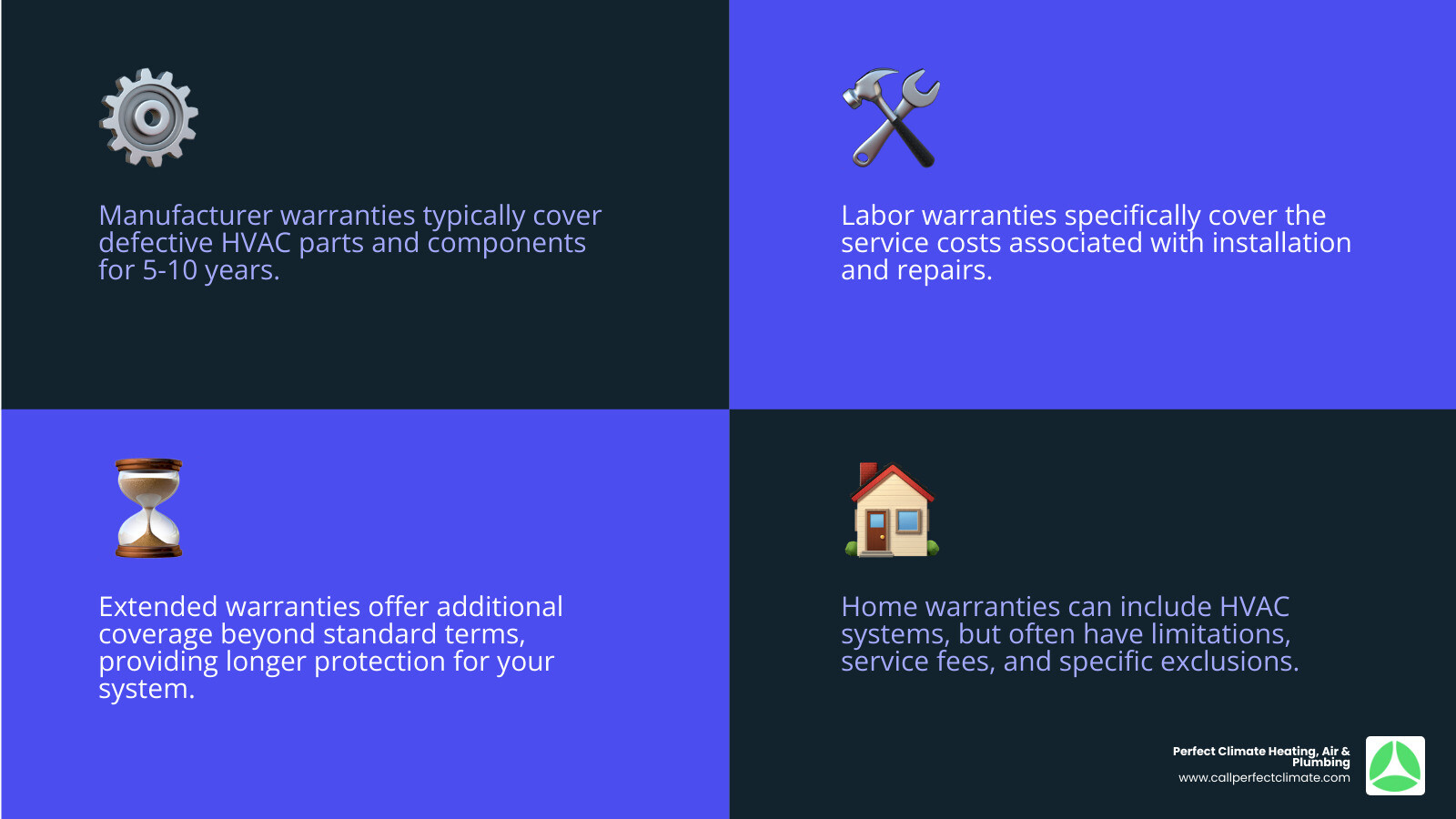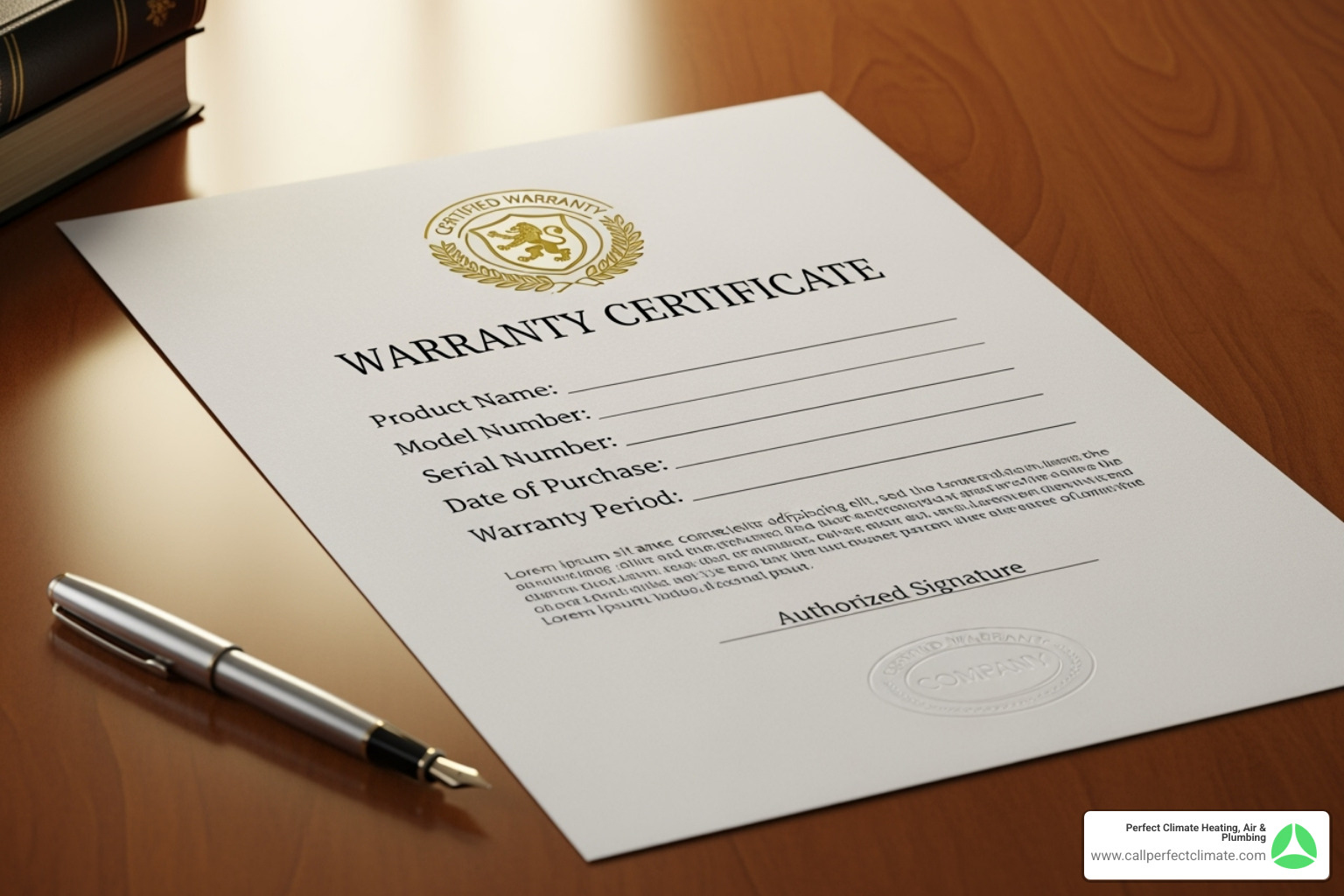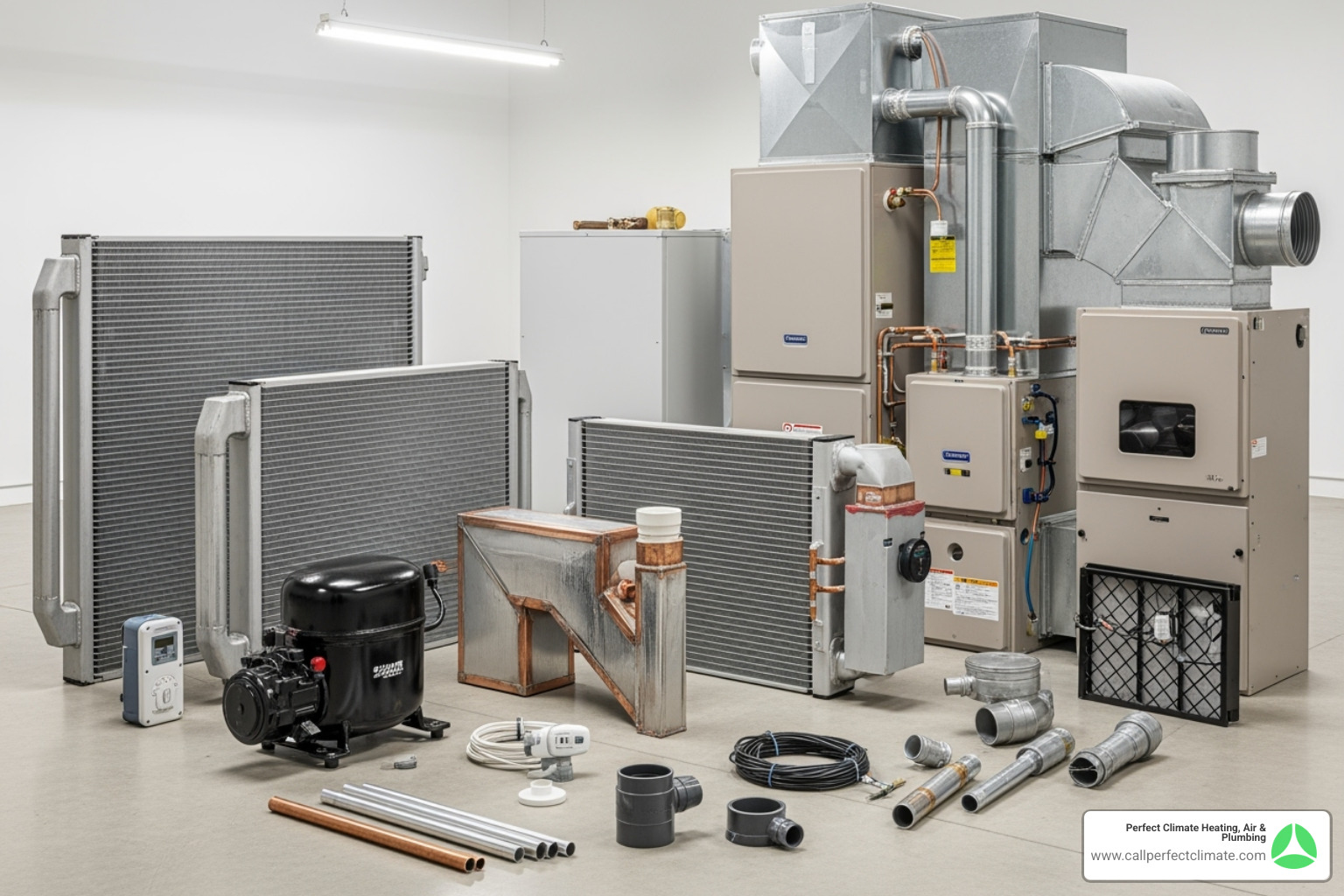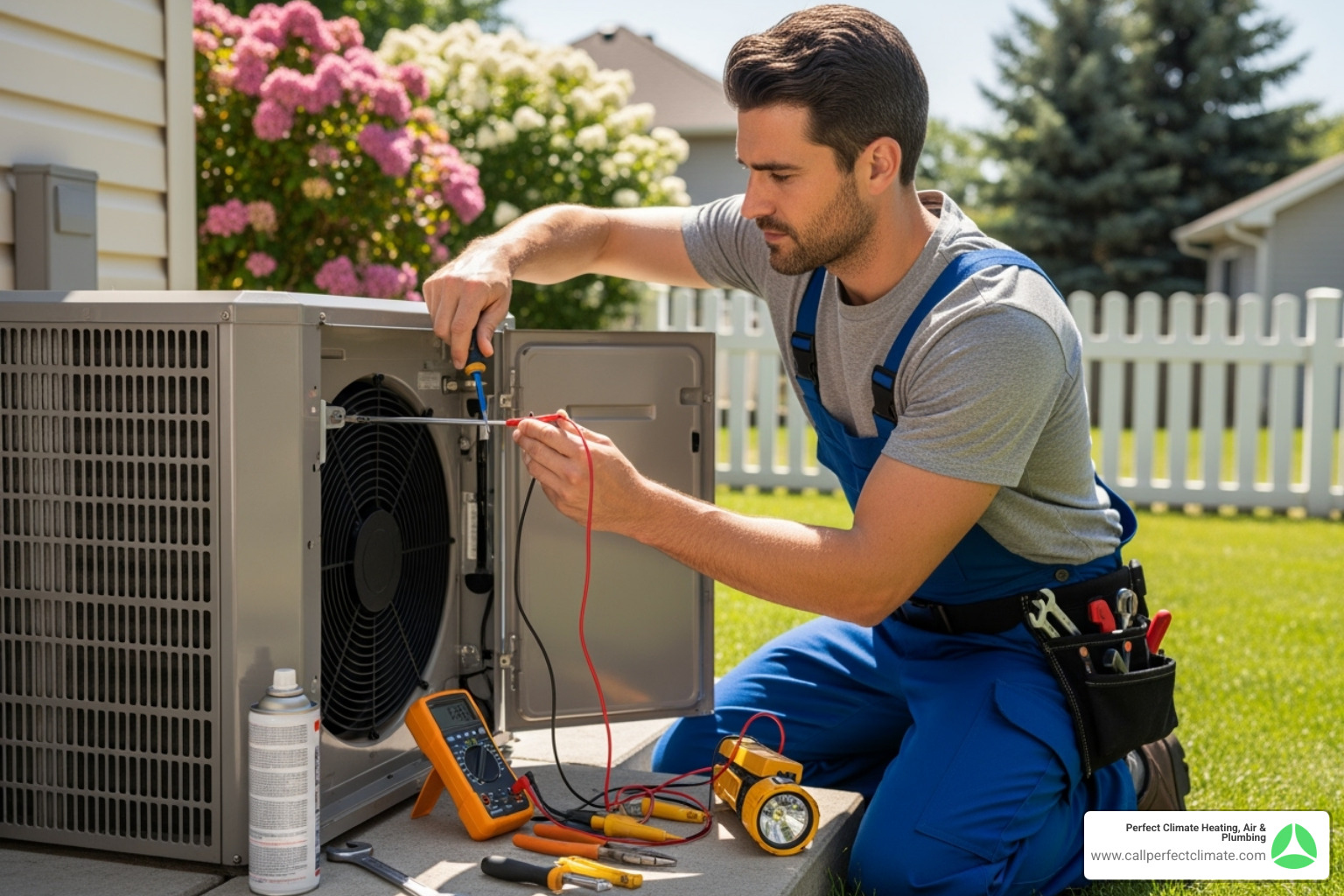Why Your HVAC Investment Deserves Warranty Protection
HVAC warranty service provides crucial financial protection and peace of mind for one of your home’s most expensive systems. When your heating, cooling, or ventilation equipment breaks down, a proper warranty can save you thousands of dollars in repair costs.
Quick Answer: What is HVAC warranty service?
- Parts Coverage: Manufacturer warranties cover defective components for 5-10 years
- Labor Coverage: Separate warranties cover installation and repair work costs
- Registration Required: Must register within 60-90 days for full protection
- Maintenance Mandatory: Annual service required to keep warranty valid
- Transferable: Most warranties can transfer to new homeowners
Your HVAC system is a major investment, often costing $5,000 to $15,000 or more. Without a warranty, you’re exposed to massive repair bills, as labor costs alone can be 50-90% of the total expense.
However, not all HVAC warranties are the same. Understanding the differences between manufacturer warranties, labor warranties, and home warranty plans can mean the difference between paying nothing for a repair versus paying thousands out of pocket.
The key is knowing what’s covered, what’s not, and what you must do to keep your warranty valid. Simple oversights like forgetting to register your system or skipping annual maintenance can void your protection entirely.
Decoding the Fine Print: Types of HVAC Warranties
Understanding your HVAC warranty is as important as choosing the right equipment. It’s your financial safety net, but many homeowners only learn what their warranty covers when their system breaks down. Don’t let that be you.
HVAC warranty service comes in several different flavors, each with its own coverage rules. Let’s break down what you’re getting with each type so you can protect your investment.
Manufacturer vs. Labor Warranty
Here’s where many homeowners get surprised: your “warranty” might only cover half of your repair costs.
A manufacturer warranty protects you against defective parts. If a compressor fails due to a manufacturing flaw, the manufacturer provides the replacement part. These warranties typically run 5 to 10 years.
But here’s the catch: manufacturer warranties almost never cover labor costs. You get the free part, but you still pay the technician to diagnose the problem and install the new one. Since labor costs often represent 50% to 90% of your total repair bill, that “free” part could still cost you hundreds or thousands.
This is where a labor warranty becomes essential. It covers the service charges and installation costs that manufacturer warranties exclude. Most reputable HVAC contractors provide at least one year of labor coverage, with many offering longer terms. When you have both, you get true comprehensive protection.
Standard vs. Extended Warranties
Not all warranties are created equal, and the protection you receive often depends on one simple action: registration.
- Base Limited Warranty is the default coverage you get if you don’t register your system, usually around 5 years for parts only.
- Registered Limited Warranty is what you get by registering your system within 60 to 90 days of installation. This typically extends your parts-only coverage to 10 years or more for major components.
The registration process is usually a simple online form. Your contractor can often help, but it’s ultimately your responsibility.
- Optional Extended Warranty takes protection to the next level. These are purchased plans that cover both parts and labor costs, often for 5 to 10 years. Think of it as premium HVAC warranty service that fills all the gaps left by standard coverage. These plans offer complete financial protection and can often be transferred to new homeowners, increasing your home’s value.
What’s Covered (and What’s Not): Inclusions, Exclusions, and Voids
Understanding your HVAC warranty means knowing the specifics of what’s included, what’s excluded, and what actions could void your coverage. Reading the fine print is essential to protecting your investment.
Typical Inclusions and Exclusions
Generally, manufacturer warranties for HVAC warranty service cover major components essential to the system’s operation.
Typical Inclusions:
- Compressors: The heart of your air conditioning system.
- Heat Exchangers: A critical component in furnaces for heat transfer.
- Coils (Evaporator and Condenser): Vital for heat transfer in heating and cooling.
- Circuit Boards and Motors: The “brains” and “muscle” controlling the system.
However, manufacturer warranties have a list of common exclusions that can lead to denied claims.
Common Exclusions:
- Labor Costs: The cost of the technician’s time is almost never covered.
- Certain Parts: Smaller components like sheet metal, filters, capacitors, and contactors are often excluded as “maintenance” or wear-and-tear items.
- Maintenance Items: Air filters, belts, and fuses are never covered.
- Damage from External Factors (“Acts of God”): Damage from floods, fires, or lightning is typically a matter for homeowner’s insurance, not the warranty.
- Improper Installation or Lack of Maintenance: Failure to use a licensed professional for installation and annual service can void your warranty.
- Tampering or Misuse: Unauthorized modifications or repairs by unqualified individuals will void the warranty.
It’s crucial to remember that parts that break for any reason other than a manufacturer defect are generally not covered.
Common Actions That Can Void Your Warranty
Your HVAC warranty is a valuable asset, but it comes with responsibilities. Failing to meet certain conditions can invalidate your coverage.
- Failure to Register: Many manufacturers require you to register your system within 60 to 90 days of installation to qualify for the full, extended warranty (e.g., 10 years instead of 5). Missing this window can significantly reduce your coverage.
- Lack of Proof of Regular Professional Maintenance: Manufacturers require annual professional maintenance to keep the warranty valid. If a major component fails and you can’t provide service logs or receipts from a licensed technician, your claim can be denied.
- Using Unapproved Replacement Parts: Using generic or non-factory-authorized parts for repairs can void your warranty.
- DIY Repairs or Unlicensed Work: Attempting to repair your system yourself or hiring an unlicensed individual is a surefire way to void your warranty. Repairs must be performed by qualified professionals.
- Improper Installation: If the system wasn’t installed correctly by a licensed contractor, the manufacturer can deny a warranty claim.
HVAC Warranty vs. General Home Coverage: A Head-to-Head Comparison
When your HVAC system breaks down, should you rely on a general home warranty or dedicated HVAC warranty service? They are different types of coverage, and understanding the distinction can save you money and frustration. A general home warranty is a jack-of-all-trades, while an HVAC-specific warranty is a specialized tool designed for your system.
| Feature | HVAC-Specific Warranty | General Home Warranty |
|---|---|---|
| Coverage Focus | Specific to HVAC system: parts, labor (if extended), manufacturer defects | Covers a range of home systems & appliances (HVAC, plumbing, electrical, appliances) |
| Coverage Source | Manufacturer (for parts), HVAC installer/dealer (for labor), or third-party extended provider | Home Warranty Company |
| Claim Process | Directly with HVAC dealer/installer, often streamlined for HVAC issues | Through the home warranty company, who then dispatches a contractor from their network |
| Technician Choice | Often your preferred, trusted HVAC contractor who installed/maintains your system | Assigned by the home warranty company, may not be your regular contractor or a specialist |
| Coverage for Defects | Primarily covers manufacturer defects and original installation issues | Covers breakdowns due to normal wear and tear; often excludes pre-existing conditions |
| Labor Coverage | Rarely covered by manufacturer; often covered by installer’s labor warranty or extended plans | Often included for covered repairs, but with service fees and potential limits |
| Cost Structure | Manufacturer warranty included; extended/labor warranties are separate purchases | Annual premium + per-service call fee |
How General Home Coverage Applies to HVAC Systems
A home service contract (or home warranty) is an annual plan covering breakdowns from normal wear and tear for various home systems, including HVAC. While this sounds appealing, there are drawbacks. Home warranty companies prioritize repair over replacement and often use builder-grade equipment for replacements. You’ll also pay a service call fee for every visit, whether the issue is covered or not. A major limitation is the pre-existing condition exclusion, which can lead to claim denials. Furthermore, issues from poor maintenance or weather damage are typically not covered, and you may face extra charges for permits or code upgrades.
Why an HVAC-Specific Warranty Offers Better Protection
When it comes to your heating and cooling system, specialized HVAC warranty service typically offers superior protection. Here’s why.
Specialized coverage means you’re working with professionals who installed and understand your specific system. With HVAC-specific warranties, you’re guaranteed genuine, manufacturer-backed parts, not the generic components sometimes used in home warranty repairs.
The claim process tends to be smoother, with fewer claim denials for legitimate mechanical failures. Investing in an extended HVAC warranty that includes both parts and labor provides comprehensive protection, eliminating the significant out-of-pocket labor costs.
Perhaps most importantly, you maintain a direct relationship with your trusted HVAC contractor rather than being assigned a random technician from a home warranty company’s network. For a crucial and expensive system like your HVAC, specialized warranty protection provides more reliable and comprehensive coverage.
Navigating Your HVAC Warranty Service: From Claims to Maintenance
Getting the most out of your HVAC warranty service isn’t just about having coverage – it’s about knowing how to use it. With a few proactive steps, you can maximize your benefits and avoid common pitfalls.
The Importance of Timely Registration
Forgetting to register your new HVAC system is a costly mistake. Most manufacturers require registration within a 60 to 90-day window after installation to extend the standard 5-year parts warranty to a full 10 years. Missing this deadline means losing half your coverage.
The process is simple and can be done online or by phone with your name, address, installer’s information, and the system’s serial numbers. At Perfect Climate Heating, Air & Plumbing, we often handle this crucial step for our customers to ensure they receive their full warranty benefits. Always confirm with your installer that your system has been registered and keep the documentation for your records.
The HVAC Warranty Claim Process
When something goes wrong, knowing the right steps saves time and money. First, check the simple things: thermostat settings, air filter, and outdoor unit for debris. This can prevent an unnecessary service call.
If that doesn’t work, contact your local HVAC dealer first – not the manufacturer. Your dealer knows your system and can perform the repair. Our qualified technicians will diagnose the issue to determine if it’s a warrantable failure. If a covered part is needed, your dealer handles the claim with the manufacturer and installs the replacement part.
With standard manufacturer warranties, you are responsible for labor costs. If you have an extended warranty that covers labor, those costs are taken care of. Always mention your warranty status when you call.
Maximizing Your HVAC Warranty Service with Regular Maintenance
Annual professional maintenance isn’t just recommended for your warranty – it’s required. Manufacturers know that proper maintenance prevents most breakdowns and include this stipulation in their terms. Skip it, and you risk having a future claim denied.
Manufacturers actively check for proof of service when processing claims. If a major part fails and you can’t show documentation of annual tune-ups, your claim will likely be denied. Professional maintenance also catches small issues before they become expensive problems, improves efficiency, and ensures safe operation.
We recommend at least one professional service visit per year. The most important part from a warranty perspective? Keep every receipt and service report. These documents are your proof of compliance.
Some simple maintenance tasks you can handle yourself include changing filters regularly (every 1-3 months) and keeping your outdoor unit clear of debris. For a more comprehensive guide on homeowner maintenance, the U.S. Department of Energy offers helpful tips. By partnering with Perfect Climate Heating, Air & Plumbing for your annual maintenance, you’re not just protecting your warranty – you’re ensuring your system runs reliably and efficiently for years to come.
Frequently Asked Questions about HVAC Warranties
We get a lot of questions about HVAC warranty service. The warranty landscape can feel overwhelming, so let’s tackle the most common questions to help you feel confident about your coverage.
Can an HVAC warranty be transferred to a new homeowner?
Yes, most HVAC warranties can be transferred to new homeowners, especially the 10-year Registered Limited Warranty. This makes your home more attractive to buyers. The transfer usually must be completed within 90 days of the home sale, and a small fee may apply. The original system registration must have been completed for the warranty to be transferable. This is a valuable selling point that many homeowners overlook!
Does a manufacturer warranty cover labor costs?
Almost always, the answer is no. Standard manufacturer warranties are “parts-only.” They cover the cost of a defective component but not the technician’s labor to diagnose the issue and install the new part. Since labor can be 50% to 90% of the total repair bill, this is a significant out-of-pocket expense. This is why a separate labor warranty from your installer or an extended warranty that covers both parts and labor is so valuable for complete protection.
What happens if I don’t register my HVAC system?
This simple oversight can be very costly. If you don’t register your system within 60 to 90 days of installation, your warranty defaults to a much shorter Base Limited Warranty. Instead of the full 10-year parts coverage that comes with registration, you’ll typically only get 5 years. You’re essentially losing five years of protection. If a major component fails in year seven, you’ll be paying for that expensive part yourself. Don’t let this simple step slip through the cracks.
Conclusion
Your HVAC warranty service is a critical financial safety net for one of your home’s biggest investments. Understanding it protects you from unexpected, costly repairs.
The key takeaways are simple but powerful: know the difference between parts and labor coverage, register your system promptly to maximize its term, and perform the required annual maintenance to keep it valid.
The bottom line is this: treating your warranty with care makes perfect financial sense. Register promptly, read the fine print, and schedule annual maintenance while keeping good records. Specialized HVAC coverage almost always provides better protection for your heating and cooling system than a general home warranty.
At Perfect Climate Heating, Air & Plumbing, we’ve seen too many homeowners get caught off guard by warranty surprises. That’s why we’re passionate about educating our neighbors in Haubstadt, Evansville, Princeton, Newburgh, and throughout Indiana. We don’t just install and repair systems – we help you protect your investment for the long haul.
Your HVAC system works hard to keep your family comfortable year-round. Make sure your warranty is working just as hard to protect you.





